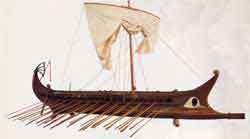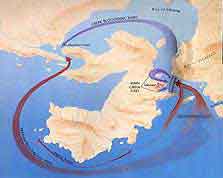THE BATTLE OF SALAMIS
The battle was fought in 480 B.C. by a huge Persian fleet of 1,000 ships led by the Persian King Darius in person. The Greek fleet, under the Athenian admiral, Themistocles, was 380 strong. The Persians were lured into a bottleneck between the island of Salamis and the mainland where they could not manoeuver. The Greek ships surrounded them and rammed the Persian ships. Aeschylus was an eye-witness either as a combatant or an observer.
“Far the greater number of
the Persian ships engaged in this battle were disabled--either by the
Athenians or by the Aeginetans. For as the Greeks fought in order and
kept their line, while the barbarians were in confusion and had no plan
in anything that they did, the issue of the battle could scarce be other
than it was. Yet the Persians fought far more bravely here than at Euboea,
and indeed surpassed themselves; each did his utmost through fear of Xerxes,
for each thought the king’s eye was upon himself. . . Artemisia.
. . distinguished herself in such a way as raised her even higher than
she stood before in the esteem of the king. For after confusion had spread
through out the whole of the king’s fleet, and her ship was closely
pursued by an Athenian trireme, she, having no way to fly, since in front
of her were a number of friendly vessels, and she was nearest of all the
Persians to the enemy, resolved on a measure which in face proved her
safety. Pressed by the Athenian pursuer, she bore straight against one
of the ships of her own party . . . and sank it . . .Thus in the first
place she saved her life by the action, and was enabled to get clear off
from the battle; while further, it fell out that in the very act of doing
the king an injury she raised herself to a greater height than ever in
his esteem. For as Xerxes beheld the fight, he remarked (it is said) the
destruction of the vessel, whereupon the bystanders observed to him, ‘Do
you see, master, how well Artemisia fights, and how she has just sunk
a ship of the enemy?’ Then Xerxes asked if it were really Artemisia’s
doing; and they answered, ‘Certainly; for they knew her ensign’:
while all made sure that the sunken vessel belonged to the opposite side.
. .Xerxes, they say, in reply to the remarks made to him, observed, ‘My
men have behaved like women and my women like men.’”
Herodotus, The Persian Wars, VIII, 86-88.
salamis



trireme